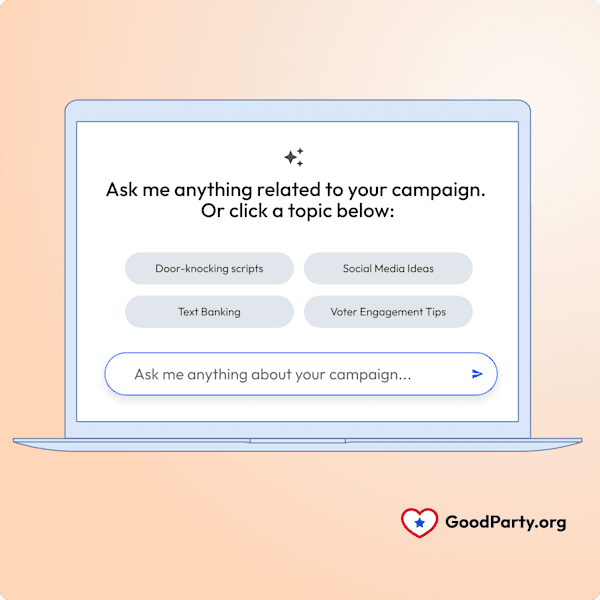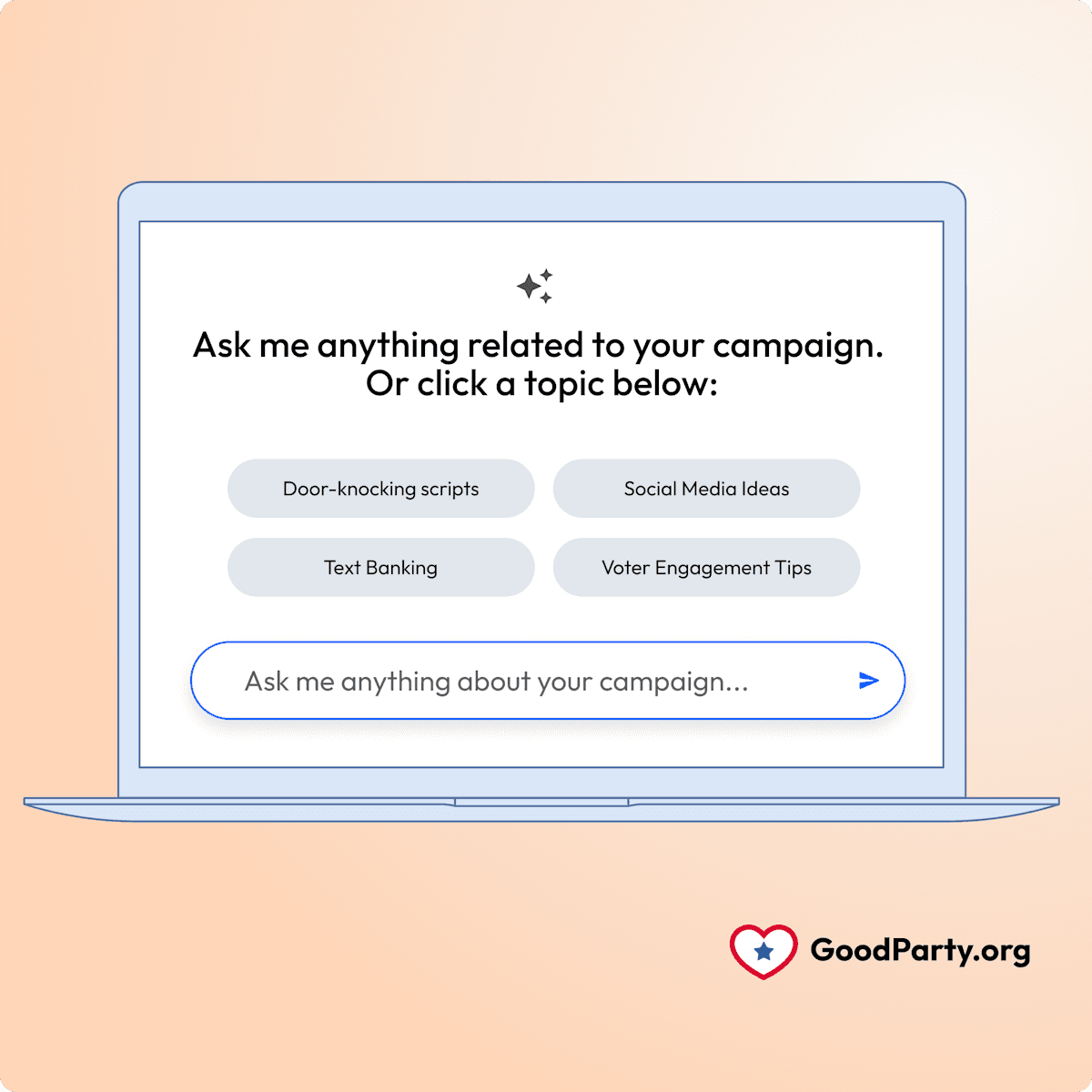
Harnessing AI for Political Campaigns (With a Human Touch)
If you’re running for local office — especially as an Independent or first-time candidate — you might wonder if using artificial intelligence (AI) is worth it for your campaign. Can AI tools give you a better shot at winning your election? And if they can, how do you get started putting this new technology to work for you?
At GoodParty.org, we’ve seen firsthand how Independent candidates can use AI tools to save time, sharpen their message, and run smarter campaigns — without losing the personal, grassroots connections that matter most.
Let’s break down how AI can save you time while running for office, freeing you up to focus on what matters most.
How to Incorporate AI Tools in Your Campaign Strategy
Major-party candidates often benefit from access to consultants, campaign staff, and expensive software. But what about people running for school board, city council, or non-partisan commissions, who often don’t have access to those kinds of resources?
That’s where GoodParty.org’s free and affordable campaign tools come in. Built specifically for Independents and newcomers to politics, our tools use AI and voter data to help candidates:
Set and track weekly goals based on a personalized win number (how many votes you need to win your election)
Draft press releases, emails, social media posts, and other campaign materials
Personalize outreach scripts for texting, phone banking, and canvassing
Generate strategic insights for door knocking and voter outreach
The tools are intuitive and built to support candidates at every level of tech-savviness.
To get started with GoodParty.org’s campaign tools:
Create your free account. Sign up for free and get started right away.
Tell us about your campaign. You’ll be asked to provide details about what office you’re running for, where you’re running, and how you’ll appear on the ballot.
Fill in your candidate profile. Once you’ve made your account, you can fill in more details about your campaign, like your top policy priorities and motivation for running for office. These details will help GoodParty.org’s AI tools create more tailored content for your campaign.
After that, you can get started creating campaign literature, outreach scripts, and more. You’ll also have access to an AI Campaign Assistant, which can answer your questions about campaign strategy and content creation.
LEARN MORE: Explore all the ways GoodParty.org’s tools can empower your Independent campaign.
Real Candidates, Real Success Stories
The beauty of AI tools is their ability to free up your time for other endeavors. That means more time talking face-to-face with voters, and less time spent stuck behind a computer screen, drafting and re-drafting email copy, press releases, or social media captions.
Here’s what three Independent candidates had to say about GoodParty.org’s AI tools:
#1: Andy Fekete, School Board Member in Huntley, IL
On April 1, 2025, Andy Fekete won a seat on the Huntley School District 158 School Board in Illinois. An Independent empowered by GoodParty.org, Fekete used the AI Campaign Assistant to help him draft voter outreach materials for his campaign.
"It's been great to have the Campaign Assistant tool to help me draft some of my social media posts and some of that work, or just taking my ideas and being able to clean it up in a more engaging way,” Fekete said.
#2: Steve Kronmiller, Mayor of Scandia, MN
Steve Kronmiller ran for mayor of Scandia, Minnesota in 2024 and won his election. Kronmiller used a variety of tactics to connect with voters, including knocking on doors, putting out yard signs, and using GoodParty.org’s AI tools to update his campaign website.
“The AI engine was very helpful where it would look at my campaign website, look at my opponent's website, and put together some information and nice words for me to at least start from,” Kronmiller said. “I looked at some of the data sets that you had, and for somebody who's never done this before, I think that's wonderful to have that available to them.”
#3: Robin Brown, School Board Member in Prince George’s County, MD
Robin Brown won her 2024 election for school board in Prince George’s County, Maryland. During her campaign, she created canvassing scripts using GoodParty.org’s AI tools, letting her more effectively mobilize volunteers.
“I thought the AI tools were very helpful,” Brown said. “I liked the script that you guys used to knock on the doors. That was helpful, because when you get volunteers, they're like, ‘Okay, what do you want me to say?’”
LEARN MORE: Looking for extra canvassing resources? Download a sample door-to-door script for your campaign team.
The Benefits of Using AI Campaign Tools
Beyond saving you time, incorporating AI tools into your campaign strategy can help you:
Personalize your messaging to different audiences or voting blocs
Quickly respond to breaking news or developing stories
Reduce campaign costs and do more with a small team
Gather insights and adjust your strategy in real time
Interpret complex data points, such as data on voters’ issue preferences or donation history
There are more opportunities to get creative with how artificial intelligence can enhance your campaign strategy and tactics. For example, one candidate and volunteer in the GoodParty.org Community, Michael Sell, recently created custom GPTs to boost candidates’ efforts in networking, brand strategy, and voter outreach.
Other possibilities for campaigns using AI include setting up website chatbots or automating campaign processes.
In the end, AI tools don’t take away your decision-making power. They also don’t replace human connection. They serve as tools in your campaign toolkit, helping you reach voters more easily and effectively.
Best Practices for Adding AI to Your Campaign Strategy
As time goes on, AI tools are becoming more advanced and more accurate. Here are a few tips to keep in mind as you start integrating artificial intelligence into your campaign strategy:
Ensure Accuracy: Provide AI engines with accurate, up-to-date information. Then review and fact check any materials drafted using AI before sharing them with voters.
Let Your Voice Shine: Edit social media captions, emails, and website copy generated with AI to reflect your unique voice and style.
Stay Aware of Restrictions: Stay apprised of any developments that might affect your usage of AI for your campaign. For example, leading up to the November 5, 2024 elections, ChatGPT restricted the use of its platform for certain political purposes.
As always, maintain a high standard of civility and ethics as you create AI-generated materials. Steer clear from creating AI-generated depictions of opponents, allowing misinformation to spread online, or letting bias infect your campaign messaging.
Get Started with AI-Powered Campaign Tools
Whether you’re new to AI or a long-time enthusiast, GoodParty.org’s campaign tools are here to make your run for office more efficient and effective.
Ready to get started? Create your free account and start enhancing your strategy with the power of AI.
Have questions about how to get started? Join the GoodParty.org Community and connect with Independent changemakers who are exploring new ways to use AI for their grassroots campaigns. You’ll find spaces to ask any questions you have, discuss best practices, and ask for help when you need it.
Our AI tools are built for people like you — everyday leaders stepping up to create change in their communities.
Photo by Daniel Thomas on Unsplash
Create your account and level up your campaign strategy with AI-powered tools.

